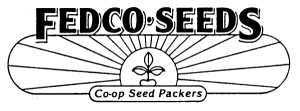By Micha Josephy
 As a member of your local food co-op, you know the difference that co-ops make in your community. And as part of our celebrations of the Co-operative Decade, the Neighboring Food Co-op Association is profiling other co-operative businesses that are helping to build a thriving regional economy.
As a member of your local food co-op, you know the difference that co-ops make in your community. And as part of our celebrations of the Co-operative Decade, the Neighboring Food Co-op Association is profiling other co-operative businesses that are helping to build a thriving regional economy.
One example is FEDCO Seeds, which has been at the forefront of a trend in co-operative enterprise that brings together multiple stakeholder groups — in this case, consumers and workers — in shared ownership. This innovation has helped them grow into one of the preeminent seed and garden supply sources for cold climate growers nationwide and a major contributor to conserving rare and heirloom plant breeds.
Founded in 1978 to sell seeds to food co-ops and buying clubs in Maine, FEDCO has grown to now offer trees, bulbs, potatoes and other gardening supplies to over 21,000 individual consumers, farmers and retailers across the country. While FEDCO was established as a consumer co-op, in 1985 they incorporated workers into their ownership structure. Now, workers and consumers split board seats and profits. Like other worker co-ops, FEDCO builds financial and personal investment in the business from the newest part-time workers to the most seasoned managers. “It means when people work at FEDCO for the first time they feel like they are working for themselves, not management,” says worker-owner John Bunker, Coordinator of FEDCO’s tree division. “It changes workplace dynamics because we’re all in this together.”
Consumer ownership brings additional benefits to FEDCO. According to CR Lawn, FEDCO founder, “our customers, and especially those committed enough to join our co-operative, have always provided us with helpful advice that has pinpointed where we need to improve our operations and shown the way to enhancing our selections and products.” For instance, consumers introduce FEDCO to rare plant breeds for propagation and sale, including genetically and historically significant breeds. “Unlike paintings, plants don’t need to be in a museum,” says Bunker, “you can propagate and reintroduce them.”
FEDCO’s catalogs are famous for their commentary and content on food policy and agriculture issues. Recently they joined a lawsuit against Monsanto, resisting the contamination of open pollinated and organic seed by genetically engineered varieties.
The wider co-op community has been central to FEDCO’s success over the years. Food co-ops have been key customers and the Cooperative Fund of New England has financed many expansions over the years. The co-op continues to grow in response to demand for organic, heirloom and non-GMO seeds and farming supplies, and in 2011 increased its warehouse and office space and purchased land to support further expansion.
FEDCO has recently launched its first membership campaign to grow membership among consumers, farms and food co-ops. “By supporting Fedco,” says Bunker, “you are growing a community-owned business that prioritizes the needs of its workers, consumers and the broader community over profit.”
To learn more about FEDCO and how you can become a member, visit www.fedcoseeds.com.
Micha Josephy is Program Manager for the Cooperative Fund of New England, www.coopfund.coop.
(To download a customizeable version of this article for use in your food co-op’s newsletter, e-news or website, click here: FEDCOprofile.iyc.2012.docx.)

